The Lady Eve, 1941, written and directed by Preston Sturges, from a story by Monckton Hoffe.
It's nearly impossible to write about The Lady Eve without violating Richard Brody's dictum that "the past should be used to nourish the present, not bludgeon it." In the general case, I think Brody's skepticism toward the TCM Industrial Complex is salutary: nostalgia for classical Hollywood cinema is usually more tribal signifier than reasoned aesthetic.1 Unfortunately, this isn't the general case, it's The Lady Eve, so please forgive me some light bludgeoning. I grant that Preston Sturges films depend on social mores that we're well rid of, but of all the films I saw in 2010, the only one that gave me more pleasure than The Lady Eve was Trouble In Paradise. Well, it's no shame losing to Lubitsch.
The world isn't exactly waiting with bated breath for another essay about how witty, humane, and generally hilarious Preston Sturges movies are, and adding my voice to the chorus seems about as useful as trying to find something totally new about Silas Marner.2 So, yeah, The Lady Eve is phenomenal: if you're looking for an appreciation of what's so great about it, I recommend starting here and moving on to, well, basically every other word anyone's written about it. If you're interested in how the film works, this is on point, and this is definitive. Adding my own words to the pile feels like proudly showing a professional con artist how to palm a card.
If by some misfortune you haven't yet seen The Lady Eve, I think giving the film-critic-Cliff's-Notes version here would be doing you a disservice, and urge you to watch it as soon as possible. But to continue my tradition of deferring to better critics, here's the plot in haiku form, courtesy of Matt Zoller Seitz3:
A snake expert and
A hustling Eve find love in
A shipboard Eden
And here's the film in a single image:
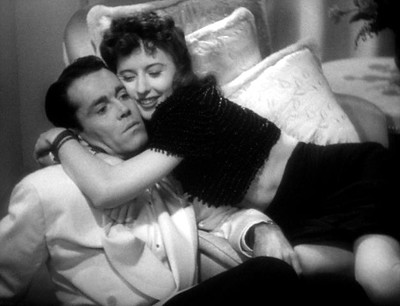
The one thing I will say is that Stanwyck and Fonda are so good in this film that too little attention is paid to supporting performances that, in any other movie, would be scene stealers. So raise a glass of Pike's Pale Ale to Charles Coburn:
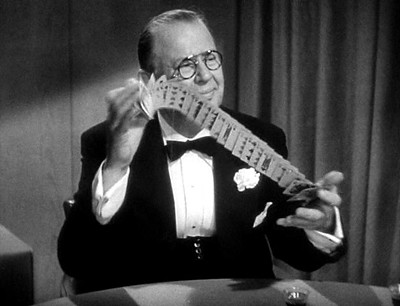
Eric Blore:
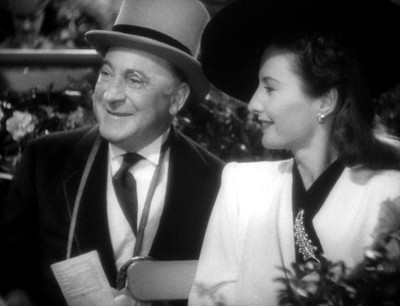
William Demarest:
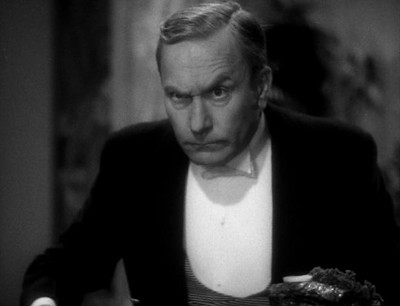
And especially Eugene Pallete, who has a pretty deep voice for an infant:
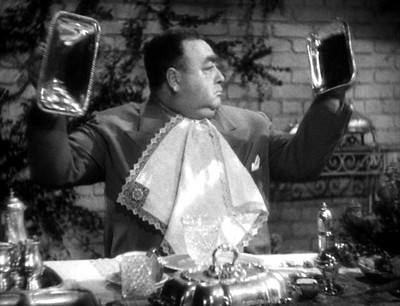
I'll stop before this turns completely into an episode of The Chris Farley Show. Tune in next week, when we'll confront the mountain of critical work that has undoubtedly already been written about Masahiro Shinoda's beloved Bunraku puppet-play adaptation Double Suicide!
Randoms
- Eugene Pallette is probably the only actor who appeared in silent films, and talkies, and set up a private "mountain fortress" in Oregon to wait out the coming nuclear apocalypse. If he'd lived long enough, he would undoubtedly have been stunt-casted in Dr. Strangelove and The Terminator. (Also, Wikipedia, in the future, please remove the Cheetos wrapper from the Hollywood Walk of Fame star before you take the picture).
- Eric Blore's appearance in The Lady Eve is a good enough pretext for me to urge you to watch Top Hat and Swing Time, both of which are wonderful. Or to be more precise, wonderful, with the exception of the blackface sequence in Swing Time.
- You may be interested to know that there was a local censor board in Pasadena.
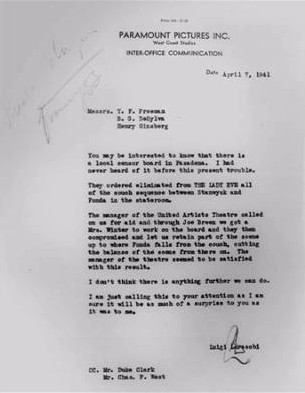
- They had about as much taste as you would imagine, since they apparently tried to cut "all of the couch sequence between Stanwyck and Fonda in the stateroom." If you saw The Lady Eve in 1941 in Pasadena, it's time for a second viewing.
1With the exception of the Janeites, there's no analog in the world of literature. The difference, I think, is marketing: as soon as Turner showed the studios how to extract money from their libraries, they've been selling the idea of Hollywood's Golden Age relentlessly. Any day now, they're going to resurrect Photoplay.
2Does anything evoke the mid-nineties as immediately as setting the "key passage" of Dunst's paper in Chicago?
3In addition to his brilliant video essays and prodigious writing for Salon.com, on Fridays Zoller Seitz writes haikus on topics chosen by his Twitter followers. He doesn't really need to—it's just virtuosity.

